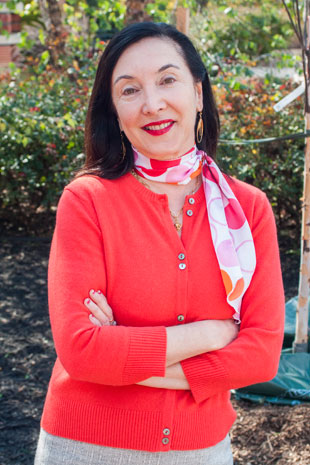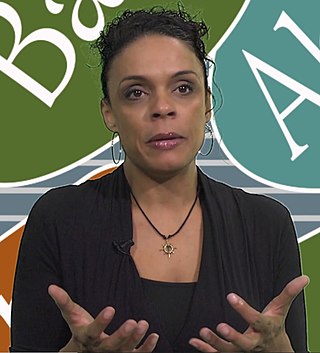Language acquisition is the process by which humans acquire the capacity to perceive and comprehend language, as well as to produce and use words and sentences to communicate.
Baby talk is a type of speech associated with an older person speaking to a child or infant. It is also called caretaker speech, infant-directed speech (IDS), child-directed speech (CDS), child-directed language (CDL), caregiver register, parentese, or motherese.
Cognitive development is a field of study in neuroscience and psychology focusing on a child's development in terms of information processing, conceptual resources, perceptual skill, language learning, and other aspects of the developed adult brain and cognitive psychology. Qualitative differences between how a child processes their waking experience and how an adult processes their waking experience are acknowledged. Cognitive development is defined as the emergence of the ability to consciously cognize, understand, and articulate their understanding in adult terms. Cognitive development is how a person perceives, thinks, and gains understanding of their world through the relations of genetic and learning factors. There are four stages to cognitive information development. They are, reasoning, intelligence, language, and memory. These stages start when the baby is about 18 months old, they play with toys, listen to their parents speak, they watch tv, anything that catches their attention helps build their cognitive development.
Language development in humans is a process starting early in life. Infants start without knowing a language, yet by 10 months, babies can distinguish speech sounds and engage in babbling. Some research has shown that the earliest learning begins in utero when the fetus starts to recognize the sounds and speech patterns of its mother's voice and differentiate them from other sounds after birth.
Simultaneous bilingualism is a form of bilingualism that takes place when a child becomes bilingual by learning two languages from birth. According to Annick De Houwer, in an article in The Handbook of Child Language, simultaneous bilingualism takes place in "children who are regularly addressed in two spoken languages from before the age of two and who continue to be regularly addressed in those languages up until the final stages" of language development. Both languages are acquired as first languages. This is in contrast to sequential bilingualism, in which the second language is learned not as a native language but a foreign language.
Developmental linguistics is the study of the development of linguistic ability in an individual, particularly the acquisition of language in childhood. It involves research into the different stages in language acquisition, language retention, and language loss in both first and second languages, in addition to the area of bilingualism. Before infants can speak, the neural circuits in their brains are constantly being influenced by exposure to language. Developmental linguistics supports the idea that linguistic analysis is not timeless, as claimed in other approaches, but time-sensitive, and is not autonomous – social-communicative as well as bio-neurological aspects have to be taken into account in determining the causes of linguistic developments.
Perceptual narrowing is a developmental process during which the brain uses environmental experiences to shape perceptual abilities. This process improves the perception of things that people experience often and causes them to experience a decline in the ability to perceive some things to which they are not often exposed. This phenomenon is a result of neuroplasticity, including Hebbian learning and synaptic pruning. Through these mechanisms, neural pathways that are more consistently used are strengthened, making them more efficient, while those pathways that are unused become less efficient. This process is most evident during sensitive periods of development. The prevailing theory is that human infants are born with the ability to sense a wide variety of stimuli, and as they age, they begin to selectively narrow these perceptions by categorizing them in a more socio-culturally relevant way. Most of the research in this area focuses on facial discrimination and phoneme distinction in human infants. However, other work has found that perceptual narrowing also occurs for music and sign language perception. Perceptual narrowing has also been implicated in synaesthesia.

Laura-Ann Petitto is a cognitive neuroscientist and a developmental cognitive neuroscientist known for her research and scientific discoveries involving the language capacity of chimpanzees, the biological bases of language in humans, especially early language acquisition, early reading, and bilingualism, bilingual reading, and the bilingual brain. Significant scientific discoveries include the existence of linguistic babbling on the hands of deaf babies and the equivalent neural processing of signed and spoken languages in the human brain. She is recognized for her contributions to the creation of the new scientific discipline, called educational neuroscience. Petitto chaired a new undergraduate department at Dartmouth College, called "Educational Neuroscience and Human Development" (2002-2007), and was a Co-Principal Investigator in the National Science Foundation and Dartmouth's Science of Learning Center, called the "Center for Cognitive and Educational Neuroscience" (2004-2007). At Gallaudet University (2011–present), Petitto led a team in the creation of the first PhD in Educational Neuroscience program in the United States. Petitto is the Co-Principal Investigator as well as Science Director of the National Science Foundation and Gallaudet University’s Science of Learning Center, called the "Visual Language and Visual Learning Center (VL2)". Petitto is also founder and Scientific Director of the Brain and Language Laboratory for Neuroimaging (“BL2”) at Gallaudet University.
Patricia Katherine Kuhl is a Professor of Speech and Hearing Sciences and co-director of the Institute for Learning & Brain Sciences at the University of Washington. She specializes in language acquisition and the neural bases of language, and she has also conducted research on language development in autism and computer speech recognition. Kuhl currently serves as an associate editor for the journals Journal of the Acoustical Society of America, Neuroscience, and Developmental Science.
Statistical language acquisition, a branch of developmental psycholinguistics, studies the process by which humans develop the ability to perceive, produce, comprehend, and communicate with natural language in all of its aspects through the use of general learning mechanisms operating on statistical patterns in the linguistic input. Statistical learning acquisition claims that infants' language-learning is based on pattern perception rather than an innate biological grammar. Several statistical elements such as frequency of words, frequent frames, phonotactic patterns and other regularities provide information on language structure and meaning for facilitation of language acquisition.
Statistical learning is the ability for humans and other animals to extract statistical regularities from the world around them to learn about the environment. Although statistical learning is now thought to be a generalized learning mechanism, the phenomenon was first identified in human infant language acquisition.
Phonemic contrast refers to a minimal phonetic difference, that is, small differences in speech sounds, that makes a difference in how the sound is perceived by listeners, and can therefore lead to different mental lexical entries for words. For example, whether a sound is voiced or unvoiced matters for how a sound is perceived in many languages, such that changing this phonetic feature can yield a different word ; see Phoneme. Other examples in English of a phonemic contrast would be the difference between leak and league; the minimal difference of voicing between [k] and [g] does lead to the two utterances being perceived as different words. On the other hand, an example that is not a phonemic contrast in English is the difference between and. In this case the minimal difference of vowel length is not a contrast in English and so those two forms would be perceived as different pronunciations of the same word seat.

Makeba Parramore Wilbourn is an American developmental psychologist and professor at Duke University in the Department of Psychology and Neuroscience. She studies how children acquire knowledge. She was awarded the Presidential Early Career Award for Scientists and Engineers from President Barack Obama. This is the highest honor bestowed on early career scientists in the US.
Johanne Catherine Paradis is a language scientist and expert on bilingual language development. She is Professor of Linguistics and Adjunct Professor of Communication Sciences and Disorders at the University of Alberta, where she directs the Language Acquisition Lab and the Child English Second Language (CHESL) Center.
Núria Sebastián Gallés is a cognitive scientist known for her work on bilingual language development and the impact of bilingualism on cognition. She is Professor of Psychology at Pompeu Fabra University where she heads the Speech Acquisition and Perception (SAP) Research Group. In 2012, Sebastián Gallés received the Narcis Monturiol Medal as recognition of her scientific contributions. She was elected Fellow of the British Academy in 2016.
Lauren Bernstein Adamson was a developmental psychologist known for her research on communicative development, parent-child interaction, and joint attention in infants with typical and atypical developmental trajectories. She was a Regents' Professor Emerita of Psychology at Georgia State University.

Elizabeth Warren Dunn is a Canadian social psychologist and a Professor of Social Psychology at the University of British Columbia (UBC). In 2015, Dunn was elected a member of the College of New Scholars, Artists and Scientists within the Royal Society of Canada.
Rochelle Newman is an American psychologist. She is chair of the Department of Hearing and Speech Sciences (HESP), as well as associate director of the Maryland Language Science Center. She previously served as the director of graduate studies for both HESP and the Program in Neuroscience and Cognitive Science and is also a member of the Center for the Comparative & Evolutionary Biology of Hearing. Newman helped found the University of Maryland Infant & Child Studies Consortium and the University of Maryland Autism Research Consortium.
Liisa Ann Margaret Galea is a Canadian neuroscientist who is a professor of psychology at the University of British Columbia. She is a member of the Centre for Brain Health and Director of the Graduate Programme in Neuroscience. Her research considers the impact of hormones on brain health and behaviour.

Fei Xu is an American developmental psychologist and cognitive scientist who is currently a professor of psychology and the director of the Berkeley Early Learning Lab at UC Berkeley. Her research focuses on cognitive and language development, from infancy to middle childhood.




